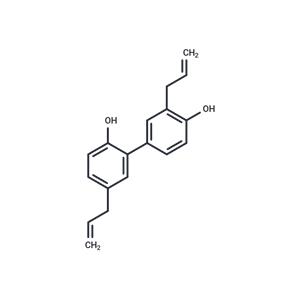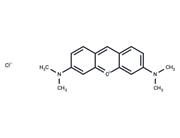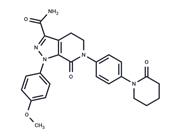| Name | Honokiol |
| Description | Honokiol (NSC-293100) is the active principle of magnolia extract. It inhibits the activation of Akt and enhances the phosphorylation of ERK1/ERK2. |
| Cell Research | Honokiol is dissolved in DMSO. In cytotoxicity assays, 10,000 cells/well are added to 96 wells plates and incubated overnight, thereafter cells are treated with different concentrations of Honokiol dissolved in dimethylsulphoxide (DMSO). Since Honokiol is not soluble in aqueous solvents, for in vitro studies Honokiol is dissolved in DMSO. To study the possible effect of DMSO on cells, solvent (DMSO) control is used at highest concentration of <0.1%. After 72 h treatment, cells are fixed and cell viability is measured by crystal violet staining (0.05%). |
| In vitro | Honokiol inhibits the growth of RKO cell tumors in transplanted mice and effectively counters SVR sarcoma in nude mice. Furthermore, when treating transplanted tumors in mice, Honokiol suppresses the growth of MDA-MD-231 breast cancer cells. |
| In vivo | Honokiol exhibits direct antiangiogenic activity by blocking the phosphorylation and racemization triggered by VEGF-VEGFR2 interaction. It promotes apoptosis in CLL cells through the activation of caspase 8, which then activates caspase 9 and 3. Honokiol demonstrates pro-apoptotic effects in cell lines of melanoma, sarcoma, myeloma, leukemia, bladder cancer, lung cancer, prostate cancer, oral squamous cell carcinoma, and colon cancer. It effectively induces apoptosis in SVR sarcoma cells and inhibits the survival of CLL cells mediated by interleukin-4, enhancing the cytotoxicity of bendamustine, fludarabine, and cladribine. Honokiol kills myeloma cells in relapsed patients at doses that do not harm PBMCs. Treatment with Honokiol reduces the phosphorylation of MAP, akt, and c-src in SVR cells. Moreover, Honokiol treatment induces the cleavage of caspase 3, 7, 8, 9, and PARP. It also induces apoptosis in colon cancer cells RKO, enhances apoptosis, and suppresses osteoclastogenesis and invasiveness by regulating the NF-κB activation pathway. |
| Storage | Powder: -20°C for 3 years | In solvent: -80°C for 1 year | Shipping with blue ice. |
| Solubility Information | Ethanol : 26.6 mg/mL (100 mM)
DMSO : 55 mg/mL (206.51 mM)
|
| Keywords | Inhibitor | inhibit | HCV | ERK | Hepatitis C virus | NSC293100 | Autophagy | Protein kinase B | PKB | NSC-293100 | Extracellular signal regulated kinases | Honokiol | Akt |
| Inhibitors Related | Stavudine | Sodium 4-phenylbutyrate | Hydroxychloroquine | Guanidine hydrochloride | Taurine | Curcumin | Oxyresveratrol | Paeonol | Naringin | Gefitinib |
| Related Compound Libraries | Traditional Chinese Medicine Monomer Library | Bioactive Compound Library | Kinase Inhibitor Library | Anti-Cancer Clinical Compound Library | Anti-Viral Compound Library | Drug Repurposing Compound Library | Natural Product Library for HTS | Anti-Aging Compound Library | Anti-infective Natural Product Library | Anti-virus Traditional Chinese Medicine Monomer Library |

 United States
United States



